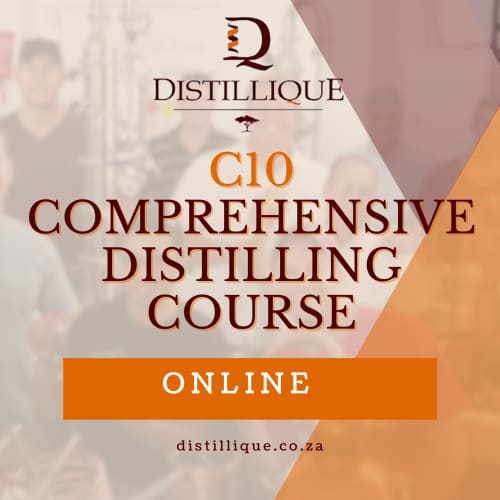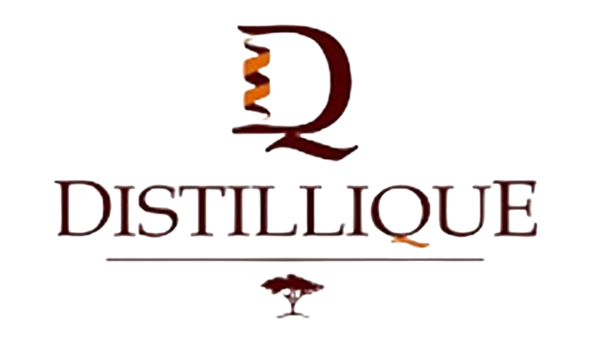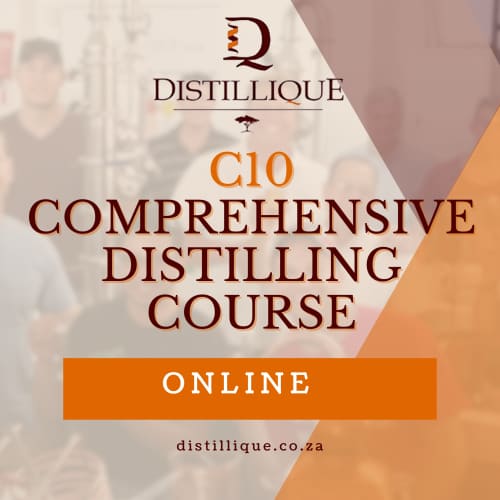distillique
C10 - ONLINE Comprehensive Distilling Course
C10 - ONLINE Comprehensive Distilling Course
Couldn't load pickup availability
This course is now online and available form our Internet learning platform. The course fee includes a 6-month access period, after 6 months, the student will no longer have access to the course videos.
Learners from outside South Africa:Shipping you the printed course manual (i.e. more than 700 pages on C10) to your physical address costs us quite a bit more. Please use the International Student variant when ordering the course. |
Once we receive your payment, a printed course manual will be couriered to you with a voucher number (local in South Africa) and a link where you can start your online training.
This course will allow you to understand and become familiar with the basics of distilling, learn the terminology used, the different types of stills, and much more.
While this course is a lot of fun, it is a course for serious distillers.
We combine and expand the content of more than 5 distinct courses and many practical demonstration videos into one course. This is supported by 3 colour textbooks (totalling over 700 pages of worthwhile information) as well as additional notes, cheat sheets, flow diagrams and more.
At the end of the course, you may select (as part of the course fees) to write a 2-hour exam to earn your "Comprehensive Distilling Course" certificate (Required Mark to Pass: 70% minimum).
After your exam has been marked and verified, you can collect the certificate from our store or have it sent via courier (at the client's cost).
During the course, you will cover in-depth the following Master Principles, both in theory and practice:
- Fractional Distillation - Selecting Desired and Undesired Aromas and Tastes during Distillation
- Starch Conversion - Conversion of Unfermentable Carbohydrates into Fermentable Sugars
- Steam Infusion - Creation of Flavored Spirits through the process of Steam Distillation or Vapor Infusion
- Sensory Analysis - Training and Using Your Sense of Taste and Smell
- Spirit Blending - Mixing Spirits in a Scientific and Controlled fashion to create repeatable Recipes and Processes
- Dilution - Dilution of Spirits down to Legal Minimum Strength, as well as working with High Brix Content Raw Materials (Molasses and Honey)
Course Contents
Fermentation, Distillation and Spirit Enhancement Theory
Spirit Production Overview
- Short History of Distillation
- Alcoholic Beverages, Feedstocks and Method Examples
- The Role of Geographical Naming Differences
- Legislation for Home Distilling
- Legislation for Commercial Distilling
- Safety during Distilling
- Responsible Drinking
Fermentation Overview
- Fermentable and Non-Fermentable Sugars
- Starch Conversion
- Types and Roles of Enzymes in Distillation Fermentations
- Congener Formation and Control
- Fermentation Components
- Sugar Measurements and Sugar Calculations
- Yeast and Yeast Requirements
- Successful and Failed Fermentations - Trouble Shooting and Fixing
Distillation Overview
- What is Distillation?
- Distillation Physics
- Use of the Phase Diagram during Distillation
- Development of Still Types
- The Role of Copper in Stills
- Heads, Hearts, Tails and other Fractions
- Effect of Boiling Rate on Fractions
- Fractional Distillation or Precision Distillation
- Spirit Enhancement
- Simple Enhancement Techniques
- Enhancement by Removal
Enhancement by Addition
- Enhancement by Transformation
Fruit Based Spirits
Brandy and Mampoer (Eau de Vie) Overview
- Difference between Brandy and Mampoer
- Legislation regarding Brandy and Mampoer
- Discussion on the future of Brandy and Mampoer in South Africa
- History of Brandy and Mampoer
- Regional Differences of Fruit-Based Spirits
- The Cultural Distillers Guild
- Brandy and Mampoer Methodology
Unique Aspects of Fruit-Based Fermentations
- Fruit Selection and Preparation
- Open vs Closed Fermentations
- Fermentation Management
- Clarification Techniques
PRACTICAL - Making a Fruit Based Fermentation
Fractional Distillation Overview
- Fractional or Precision Distillation
PRACTICAL - Distilling a Fruit Based Fermentation
PRACTICAL - Sensory Analysis of Heads and Tails
Spirit Enhancement in Brandy and Mampoer
- Techniques Relevant to Brandy and Mampoer
PRACTICAL - Blending of Selected Fractions and Dilution
PRACTICAL - Obscuration and Wooding of Spirits with Sensory Analysis
Starch Based Spirits
Whisk(e)y, Moonshine and Vodka Overview
- Difference between Whisk(e)y, Moonshine and Vodka
- A History of Whisk(e)y, Moonshine and Vodka
- Regional Differences in Whisk(e)y - Scotland, Ireland, USA and South Africa
- Whisk(e)y and Moonshine Methodology
- Innovating with Whisk(e)y in South Africa
PRACTICAL - Doing a Starch Conversion
Unique Aspects of Starch Fermentations
- Grain Bill and Milling
- Starch Extraction, Conversion and Steeping
- Malting and Enzyme Sources
- Sterilization
- Sparging
PRACTICAL - Making a Grain Fermentation
Vodka Distilling
- Still, Types Used for Vodka Production
- Different Still Configurations in Commercial Distilleries
- Using Multiple Stills in a Commercial Distillery
- Stripping Runs vs Spirit Runs vs Rectifying Runs vs Infusion Runs
- Reflux Modes in Fractional Distillation
PRACTICAL - Distilling a Grain Based Fermentation
Spirit Enhancement in Whisk(e)y, Moonshine and Vodka
- Techniques Relevant to Whisk(e)y, Moonshine and Vodka
PRACTICAL - Blending of Selected Fractions and Dilution
PRACTICAL - Obscuration and Wooding of Spirits with Sensory Analysis
Gin and Botanicals
Gin Overview
- A History of Gin
- Garnishing of Gin
Gin Production
- Gin Production Process
- Feedstock for Gin
- Base Spirits for Gin
- Botanicals for Gin
- Ginning Methods
- Flavoring Runs
- Sweetening Methods and Levels
- Maturation Methods
- Naming a Gin
- Categorization and Naming Based on Production Processes
Creating a Gin Flavour Profile
- Communicating a Flavour Profile
- A Classification Methodology for Gin
- Tasting and Classifying Gin According to the Methodology
- Sensory Analysis and Tasting
- Utilisation of the Classification Methodology for Market Research and Product Development
PRACTICAL - Sensory Analysis and Tasting of 6 or more Gins
Creating and Using a Flavor Library
- Making Infusions
- Blending Flavours
- Creating a Single-Shot Recipe
PRACTICAL - Botanical Infusion through Steam Infusion and/or Infused Distillation
PRACTICAL - Dilution of Spirits
PRACTICAL - Blending of Infused Spirit Compounds
PRACTICAL - Application of Obscuration Techniques to Gin
Spirit Enhancement in Gin
- Techniques Relevant to Gin
High Brix Content Raw Materials
Light, Dark and Spiced Rum Overview
- Differences between Light, Dark and Spiced Rum
- A History of Rum
- Regional Differences in Rum
- Rum Methodology
Unique Aspects of High Brix Content Raw Material Fermentations
- Sugar Source Selection
- Sugar Source Calculation
- Sugar Source Preparation
- High Brix Content Raw Material Fermentations
PRACTICAL - Making a Molasses Fermentation
Distilling a High Brix Content Raw Material Fermentation
- Using Anti-Foaming Agent
- Applying Fractional Distillation to Non-Fruit Fermentations
PRACTICAL - Distilling a Molasses Fermentation
PRACTICAL - Sensory Analysis of Heads and Tails
Spirit Enhancement in Rum
- Techniques Relevant to White, Gold, Dark and Spiced Rum
PRACTICAL - Blending of Selected Fractions and Dilution
PRACTICAL - Obscuration and Wooding of Spirits with Sensory Analysis
Course Fees include:
- Printed course manual couriered to you (South African students only)
- Downloadable presentation slides
- Access to the learning platform with access to the full set of training videos for 6 months.
You would require:
- Good Internet connection
- Preferably a laptop or desktop PC with sound to view the videos (Smartphone screen just too small)
- Pen and paper to take your notes
- You can pause, rewind, and replay a video to ensure you do not miss an important part.
Please Note:
Unfortunately, none of the online courses can be cancelled after a voucher number or link has been emailed to you.
Share

Excellent course with a lot of detail and information to get the perfect home distilling
Very good
I recently completed the C10 Comprehensive Distilling Course and submitted my answer sheet for marking. This course is indeed comprehensive and covers a vast amount of subject matter. You will need to invest a lot of time and effort into completing all the lectures and do a bit of studying through the supplied literature before you tackle the examination at the end.
The course is well laid out and presented by Hendre whom knows his subject matter well and does a good job of transferring his knowledge and experience in the field. I would recommend this course to anyone from a hobbyist like myself to someone who would like to pursue a possible commercial venture in fermenting and distilling.
I would have liked to include some hands on experience with both the fermenting and distilling disciplines, but understood that I signed up for online only training from the get go.
Thank you to the Distillique Team and all the behind the scenes people involved in presenting a thorough and professional course. Highly recommended and best of luck with your future ventures.
Beste waarde vir jou Rand in gisting en stoking - beide in wydte en diepte ...
The course is well worth while to anyone wanting to up their game. Very informative and well laid out.
The course notes and videos are very comprehensive with stacks of information.

